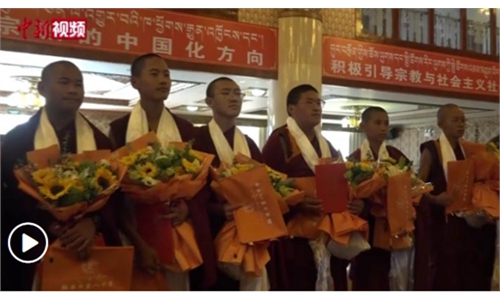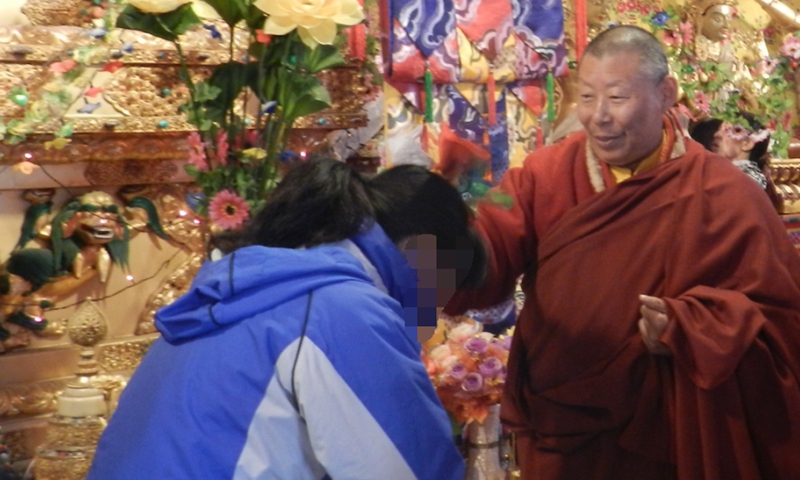
Wang Xingfu disguises himself as a living buddha. Photo: file picture
Over the years, with the popularity of Tibetan Buddhism, many people including some television celebrities have been worshiping "Living Buddhas." Seeing profits in this, some lawbreakers made use of people's devotion to the religion to amass large amounts of money and even rape their disciples.
The Global Times dug out how two fake Living Buddhas used religion to harm their disciples.
Prison guard-turned 'living buddha'
Wang Xingfu, who claimed himself a "Living Buddha" and used the name of Lhosang Tenzin, swindled hundreds of millions of dollars and even raped several women over the past decades.
Wang had 21 "Ashrams" and more than 3,000 "disciples" across China. Before proclaiming himself as a "Living Buddha," Wang dubbed himself a "qigong master" in late 1980s when the country was caught up in a "qigong frenzy."
Like many other fake qigong masters, Wang profited from the wave. He embezzled the Tibetan Buddhism and fabricated a so-called "secret school of mind recharge."
Then he set up classes in cities including Ji'nan, Chengdu and Shenyang, earning more than 5,000 yuan ($773) or even as much as 7,000 yuan a month, a high income in the late 1980s and early 1990s in China.
Seeing the profits, Wang who was a prison guard at that time, had no interest in his work and kept asking for leave until he was fired. In the middle and late 1990s, as the government cracked down on the fraudulent "qigong masters," Wang changed his "secret school of mind recharge" to "ancient yoga theory application research institute," and developed a so-called "supreme secret yoga" to cheat money from disciples.
In 2006, Wang got to know the a Living Buddha named Gongzhi in Eruo Monastery, Ganzi Prefecture, Southwest China's Sichuan Province. Gongzhi was well known there and at that time he was seriously ill.
Wang, who was desperate to "legitimize" his schemes by using Tibetan Buddhism, tried hard to curry favor with Gongzhi. He took his "disciples" to donate money and goods worth over 1 million yuan to Gongzhi's temple. He then also claimed to have studied Buddhism in temples for many years and is the reincarnation of a "Living Buddha."
As a result, Gongzhi took Wang as his only disciple outside the Tibetan regions and told his disciple, Lurong, who would take over as the abbot of Eruo Monastery, to be good to Wang.
Lurong at the beginning did not welcome Wang but his attitude changed when he saw Wang was able to support the temple.
In 2008, Lurong illegally held an "enthronement ceremony" for Wang and claimed Wang as a Living Buddha named Lhosang Tenzin and even gave him a fake ID card showing Wang as Tibetan. Wang even fabricated a "reincarnation system" for himself.
In 2016, Wang divorced with his wife. When the case was exposed, Lurong was asked by the police why he illegally hosted "enthronement" for Wang and forged him as a "Living Buddha." Lurong said that Wang had many disciples and could donate money and goods to the temple.
After being arrested, Wang also attacked Lurong whom he used to call "vajra brother," saying Lurong treated him as a money machine and he felt deep "regret."
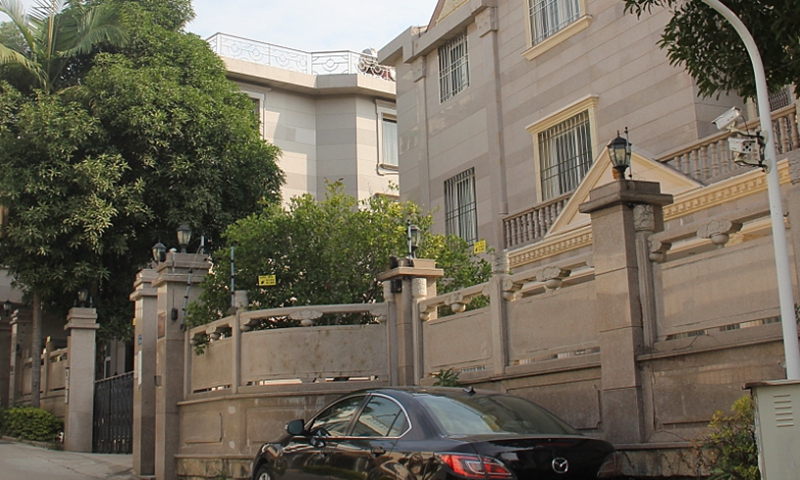
Wang Xingfu's villa in Xiamen, East China's Fujian Province. Photo: file picture
'Religious teaching' for money
After becoming the "Living Buddha Lhosang Tenzin" following his "enthronement" in 2008, Wang became even more unscrupulous and committed many heinous crimes on his followers, such as fraud, molestation and even rape.
Before his crimes were uncovered, many of his followers, who had been seriously harassed by him, did not consider themselves victims of Wang's crimes, and some even chose to defend him.
One of his followers surnamed Wei said Wang controlled his disciples' mind in a horrific manner - he made the disciples swear not to betray him, otherwise, they would suffer terrible retribution and even lose their lives.
Laxianjia, vice director of the religious institute of the China Tibetology Research Center, said Tibetan Buddhism has "Exotoric Buddhism" and "Esoteric Buddhism." A disciple usually needs to spend more than 20 years in the period of "Exotoric Buddhism" with his or her master. During this period, the disciple can question and even change masters. But once the disciple passes "Exotoric Buddhism" stage to "Esoteric Buddhism," the disciple must fully follow the teachings of the master whom he or she had identified during the "Exotoric Buddhism" stage.
Laxianjia believed Wang used the close relations between disciple and master in the "Esoteric Buddhism" stage to make his disciples willing to be controlled. Laxianjia said Wang actually knew nothing about Buddhism, after questing Wang when he was in detention.
One of his disciples said that most of Wang's disciples were in urgent need of consolation of the faith due to their own or family troubles and Wang is good at using some concepts in Buddhism to appease these people.
Some had doubts about Wang, but their doubts were relieved when they saw how Lurong received Wang in the monastery.
According to the police investigation, the main way Wang cheated money was to charge people for his teachings. The money varied from 300 yuan to 8,000 yuan. He also sold "religious instruments" and carried out "religious activities" to make money. He made nearly 200 million yuan in more than 10 years.
Wang spent the money buying houses and properties across the country and gave his wife and son money. Wang said he gave Lurong more than 40 million yuan.
Besides fraud, Wang even used the concept of "Yuganaddha" to molest and rape female disciples.
Laxianjia said that the "Yuganaddha" in Tibetan Buddhism is about the combination of "wisdom" and "methods" rather than the nonsense that Wang talked about.
When he was arrested, police found condoms and "oil" that can boost sexual drive. He claimed the disciples he raped had consented.
Some of his disciples who had sex with him said Wang called them to the room for sex.
One of the women who was raped by him in 2013 said Wang came to the hotel in casual clothes after she checked in at his request. After she kowtowed to Wang and told him her family's problems and asked for his blessings, Wang became impatient and said the disciple needs to offer the master the body and mind. Wang later peeled off her clothes.
"I knew what he wanted to do then. I was quite scared. But as I thought he was a Living Buddha, and I was afraid that if I rebelled against him, there would be retribution. I didn't dare to resist. I just knelt down and cried and kowtowed to him," she said.
So far, investigators have evidence that Wang has sexually assaulted at least 10 female "disciples" over the years, including eight who were raped and two who were indecently assaulted.
A police officer told the Global Times that due to the reluctance of most victims of sexual assault cases to come forward, and the long time span of Wang's crimes, the number of women raped by Wang may be far higher.
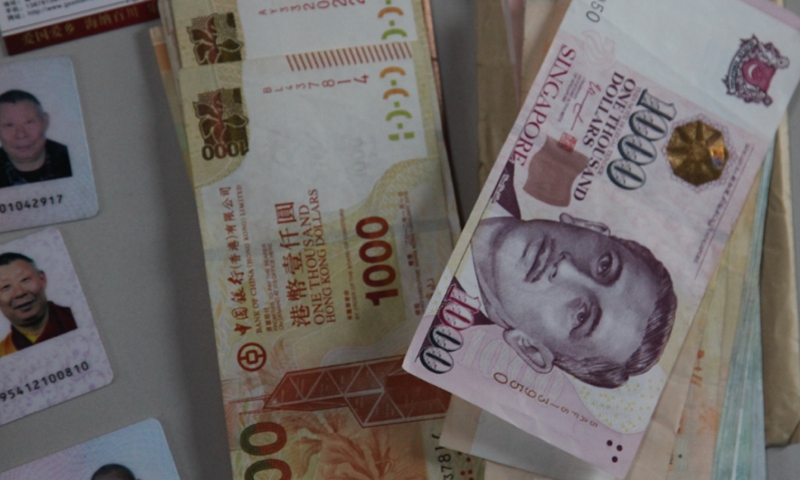
Cash and foreign banknotes are found by the police from Wang's residence. Photo: file picture

Cash and foreign banknotes are found by the police from Wang's residence. Photo: file picture
A key accomplice
Wang would not have had the opportunity to commit such heinous crimes if it weren't for Lurong, the abbot at Eruo Monastery.
Lurong, through stealing and violating the traditional convention of Tibetan Buddhism, turned Wang, a liar from qigong, into a "living buddha" and helped Wang deceive a huge number of believers in the country.
Lurong has known of Wang's crime as early as 2016, when a woman follower of Wang reported his sexually assaulting women and looting money. But Wang reminded Lurong about how the Eruo Monastery had been depending on Wang's followers' sponsorship.
To not lose Wang as a "money machine," Lurong became Wang's accomplice. He not only published an "investigation report" to prove Wang did not have any problem, but also hired people to remove online posts reporting Wang.
All the punishment Lurong gave Wang was letting him confess in front of the sacred tower and warning him to be a "qualified monk."
"I felt he wanted to use my money to renovate the monastery in order to lift his prestige among locals," Wang said.
From the perspective of Tibetan Buddhism, Lurong's behavior is also a serious violation of Buddhism, said Zhou Wei, an expert on Tibetology. "It completely violated the philosophy of Tibetan Buddhism and the concept of "integrity" in religion. It is all crooked ways."
This is also the reason why the two were prosecuted for "organizing and using a cult to undermine the implementation of the law." Their behavior deviated from Tibetan Buddhism and has long become a "cult."
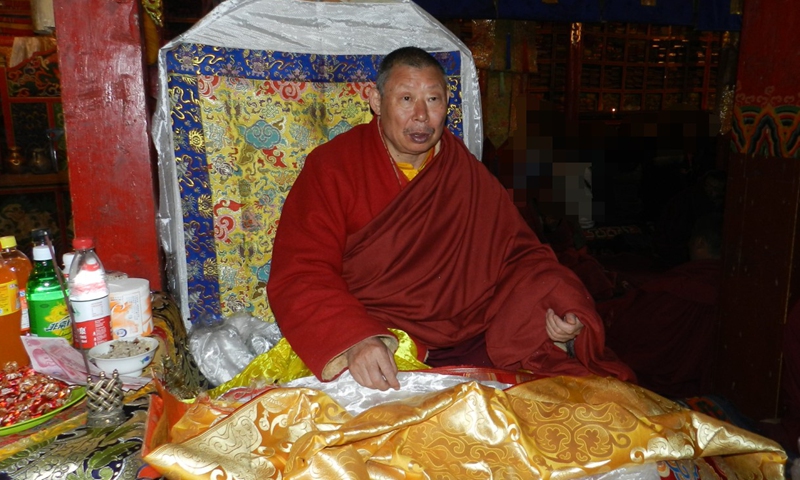
Wang Xingfu during an illegal "enthronement" in 2008 which seriously violated Tibetan Buddhism rituals. Photo: file picture
Another monster
Apart from Wang's case, police also cracked down a fake living buddha case as appalling as Wang's in Shenzhen of South China's Guangdong Province.
Yang Hongchen, the main suspect in the Shenzhen case, was born in Northeast China and became a monk in a small Hongye Temple in North China's Hebei Province in the late 1990s.
Afterwards, he went to Labrong Monastery in Northwest China's Gansu Province and fabricated a "living buddha" certificate and an ID as a Tibetan. With the new identity, he returned to Hongye Temple and began to deceive people there.
To bamboozle more people, he claimed himself to be the former head of the Chinese Buddhism Association and the reincarnation of respected patriotic monk Sherab Gyatso.
Many victims in Yang's case said that believed Yang's story. But monks in Labrang said Yang was never a monk in the monastery, let alone a living buddha. People from Yang's hometown said Yang wasn't even a monk.
Before 2017, Yang already had dozens of believers. He also raped many of his female followers and caused one to get pregnant.
Under the mind control of Yang, the violated women were either afraid of being cursed by the "living buddha" or believed it was for religious progress. None of the women chose to report Yang's assaults.
Finally, Yang's hedonistic life style drew suspicion from a follower, who reported to the religious administration department in Shenzhen.
The fair trial
In the past three years, the relevant persons involved in the Wang, Lurong and Yang cases have been convicted of serious crimes by the court in the first trial, and completed the second trial this year.
Wang was sentenced to 25 years in prison and fined 20 million yuan for crimes of organizing and utilizing a cult to undermine laws, illegal operation, rape and compulsory indecency. Lurong was sentenced to six years imprisonment and fined 5 million yuan.
Yang was put in jail for 18 years and fined 150,000 yuan for using superstition to undermine law enforcement, fraud, rape and embezzlement. He pleaded not guilty in both court trials and blamed his followers.
Police believe that such scams are still hidden in society, and because some victims are mentally controlled, it greatly increases the difficulty of investigations.
To identify such criminals, Li Hanying, former senior official on religious affairs at the United Front Work Department of the Communist Party of China Central Committee, reminded that the public can check the identity of a "living buddha" at an online query system of the State Administration of Religious Affairs or check with local religious departments.
Li noted that Buddhism is a religion of rationality and wisdom and believers should not blindly obey someone because of admiration. Therefore, everyone must establish this concept of "right faith" and improve the quality of faith and the ability to differentiate between good and evil.
Once a suspicious "living buddha" is discovered, it is even more important to quickly report him to the religious affairs department and public security organs, Li said.
These cases also have triggered thinking of related departments on how to strengthen supervision, stop such frauds in the name of religions, and upgrade publicity on such crimes.
Laxianjia suggested that schools could open some courses on common sense about religions. "It is not to spread religions on campus, but to tell people the essence and knowledge of religions and lead people to have the correct values to avoid being deceived."
Lurong and some Tibetan monks served as accomplices and violated the reputation of Tibetan Buddhism, which experts believe shows Buddhist monks should strictly maintain their reputation and rituals of Tibetan Buddhism and discipline themselves, and therefore safeguard and respect for the freedom of religions in China.

